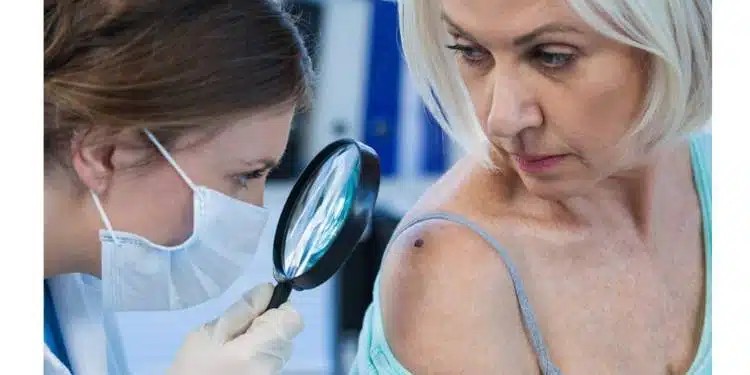Do I have skin cancer?
This question is the one people ask me most frequently outside the office. I hear it from family, friends, acquaintances, even total strangers. All the time.
For example, someone approached me not too long ago at a small birthday gathering. It was a man I met only twice before and barely knew. He walked over to me in the middle of the festivities, rolled up his sleeve to show me a brown growth on his upper arm, and asked, ‘Is this skin cancer?”
Last week I went into a department store in a mall while visiting Las Vegas. It was probably my first time in a clothing store since the pandemic hit in early 2020. I had a lovely conversation with the kind woman behind the register as she rang up my purchase, a long-sleeved shirt. She commented at one point that the temperature in Vegas at the end of March approaches 90 degrees and that I wouldn’t need long sleeves. I thanked her for the advice, but then told her I am a dermatologist and keep my skin covered as much as possible in addition to liberally applying sunscreen often. What happened next? Right there in the store, she rotated her body 180 degrees, picked up her shirt and exposed her back to me. I waited for the question I knew would follow – and it did. She asked, “Is the dark spot on the right side of my back cancer?”.
That same night, I received a Facebook message from an acquaintance passing through town. Her message read, “I just found this mole on my husband and I’m worried it’s melanoma (skin cancer). Any chance you can look at it this weekend before I leave the area?”.
What to look for
My point in sharing these stories is that it seems almost everyone, at some point, wonders about imperfections on themselves or a loved one. Could it be skin cancer?
Fortunately, you don’t need to know if something you find is cancerous or not. But you do have to find it – and find it early. You need to notice if a new growth appears, or if a preexisting mole changes in any way whether in size, shape or color. I recommend monthly skin self-exams. Why monthly? The mind is a funny thing. Think about stargazers who look up at the billions of stars in the evening time after time and can recognize the big dipper. By doing monthly skin self-exams, your mind will create an image, and if something should change, you WILL notice.
Skin self-exam tips
- Check your entire body surface once a month.
- Using a handheld mirror, carefully look at every nook and cranny on your body to find a new or changing mole or growth.
- To check your back, buttocks and behind your neck, stand with your back to a full length mirror while looking through the handheld mirror held straight in front of you reflecting off the full-length mirror.
- Skin cancer can be found anywhere on the body but is most commonly found on the legs on women and on the back on men.
The bottom line
You don’t have to know WHAT the new or changing growth is, but you do have to find it. I can’t say that enough. When found early, skin cancer, even the most deadly form (malignant melanoma) is treatable and often curable.
So stop worrying and start looking. Try to get in the habit of doing a skin self-exam every month. And if you should find a new mole, or discover that an existing mole changed in any way, call your dermatologist immediately. You’ll have peace of mind if it turns out to be a healthy benign growth, and, if cancer, you will fare well if diagnosed and treated early.
Fayne Frey, M.D.

Fayne Frey, M.D., is a board-certified clinical and surgical dermatologist practicing in West Nyack, New York. She specializes in the diagnosis and treatment of skin cancer and is a nationally recognized expert in the effectiveness and formulation of over-the-counter skincare products. As a speaker, Dr. Frey captivates audiences with her wry observations regarding the skincare industry. She consulted for numerous media outlets, including NBC, USA Today, and, the Huffington Post, and shared her expertise on both cable and major TV outlets. Dr. Frey is the Founder of FryFace.com, an educational skincare information and product selection service website that simplifies the overwhelming choice of effective, safe and affordable products available. Dr. Frey is a fellow of both the American Academy of Dermatology and the American Society for Dermatologic Surgery.
Disclosure: This article is intended to be educational and not construed as medical advice. Please see your doctor if you have concerns about possible skin cancer.










